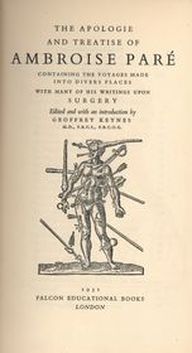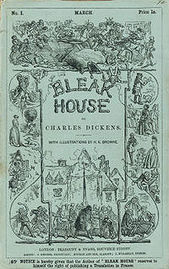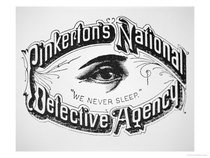 17th c. detective of poisons A few weeks ago, I wrote about the first female literary sleuths, and since then I've since been wondering about the real first "detectives." I don't mean just any investigators of criminal activity, for surely, those have existed since time immemorial. But I was curious about when the term "detective" emerged as a recognizable title and/or occupation. The word does appear in the Early English Books Online as early as 1634. However, the word detective was not used as a noun, but rather as a verb, referring to the process of detecting. Specifically, the "famous chirugion [surgeon] Ambrose Parey" detective the effects of deadly poisons on the human body. Turning to my trusty Oxford Etymological Dictionary, I found that as a noun, "detective" was not used before before 1843. According to the Chambers Edinburgh Journal, "Intelligent men have been recently selected to form a body called the ‘detective police’‥at times the detective policeman attires himself in the dress of ordinary individuals." (12: 54). The word was later referenced in Willis' discussion of modern thief-taking in 1850: "To each division of the Force is attached two officers, who are denominated ‘detectives’" (C. Dickens, Househ. Words 13 July 368/1). Prior to 1850, those conducting investigations might have been called a searcher (1382), intracer (?a1475), inquisitor (?1504), inseer (1532), theif taker (1535) (my favorite, and the one I use!), peruser (1549) investigator (1552), tracer (1552), scrutineer (1557), examiner (1561), revisitor (1594), researcher (1615), examinant (1620), indagator (1620) (that's a great one!), ferret (1629), (another great one!), pryer (1674A), probator (1691), disquisitor (1766), grubber (1776), prober (1777), plant (1812), grubbler (1813), and plain clothes (1822). After 1850, additional colorful slang variants were used: Plainsclothesman (1856), mouser (1863), sleuth (1872), tec (1879), dee (1882) (shortened version of detective), sleuth-hound (1890), split (1891) (evolution of informer, turning against another person), hawkshaw (1903) (a character in a play), busy (1904), gumshoe (1906), (from the quiet stealthy shoes detectives began to adopt), dick (1908) (comes from a colloquial collapsing of 'detective'), and Richard (1914) (the common surname for nickname Dick). (Most of these expressions, it should be noted, came from criminal slang) And the first real person to be called detective? Well, it's hard to say...  In literature, the first detective is usually considered to be August Dupine in Edgar Allen Poe's Murder in the Rue Morgue (1841) (although I don't think he's referred to in the original version as a detective). Paul Collins, an associate professor at Portland State, a.k.a. the literary detective, has made the case for Charles Felix's detective in Velvet Lawn (1862) as the first of the genre. (On my list to read!). Others have argued for Inspector Buckett from Charles Dickens' Bleak House (1853), who may well have been based on a real private investigator that Dickens knew.  "We never sleep?!" Hey, that's my motto These works, demonstrating the emerging professionalism of detectives (or inspectors), clearly were influenced by larger nineteenth-century trends--most notably the ongoing reform efforts (which called for systematic, often covert, investigations into the corrupted and abusive practices found in factories, prisons, schools, hospitals, etc). Something else accompanied that change. As an investigator, the nineteenth-century detective was trying to systematically solve problems, using science to find solutions to the puzzles that plagued society. The "new" detectives were adopting a scientific, logical quality to the process of capturing criminals. The first known (and organized) private detective agency emerged in France in 1833. This occurred under the auspices of Eugène François Vidocq, a soldier turned privateer, who lived much of his early life on the run from from the law. (Apparently, Victor Hugo was so impressed with Vidocq that he based not one, but two, of his most important characters in Les Miserables--both Jean Valjean and Inspector Javert--on the man). Officially, however, at least in the U.S., Allen Pinkerton, a transplant from Glasgow, Scotland became Chicago's first detective in 1849. Soon after, he set up his famous Pinkerton National Detective Agency in the 1850s. Ultimately, this professionalization of the detective--with its' new emphasis on applying science, logic and technology to catching criminals--gradually reshaped the image of the investigator from "thief taker" to puzzle solver. These trends seem to have substantially influenced at least the first few generations of literary detectives, maybe more. Enter Sherlock, Poirot and all those who rely on "their little grey cells" to solve mysteries... (I do think the recent trend of paranormal crime solvers indicates the inevitable backlash, however, but that's another story). What do you think?
9 Comments
3/11/2012 12:43:17 am
The first thief takers and murderer-takers in England are the Bow Street Runners, established by Henry Fielding and his blind brother, John, who was also a Magistrate. That's in the mid-18th century. They were given Parliamentary support. And they were one answer to the rising crime rate of London at the time. They dealt with all kinds of cases, but mostly murder.
Reply
3/11/2012 01:09:18 am
M.M. Bennetts--you're so right! I was thinking less about the overall growing professionalism of police overall (although that's part of the larger nineteenth-century trend), then about the rise of the actual detective. Do you know--were the bow street runners considered "detectives?" (Is Thomas Pitt in the Anne Perry novels a Bow Street runner? I think she's spot-on in her consideration of how those 'runners' were originally treated by--ahem--their "social betters.") :-) Thanks for commenting!
Reply
Matt
3/12/2012 01:09:45 am
Great post! I especially love hearing all the different descriptors/names that such investigators were called...and the fact that many of the names actually came from criminal slang. Fascinating.
Reply
3/13/2012 04:08:13 am
Matt, hmmmm I like the way you're thinking! maybe I can combine this logo with my interest in eye portraits...
Reply
8/28/2012 02:02:18 am
Loved your blog layout that I created a weebly account too.
Reply
2/15/2013 02:13:54 pm
The concept of detective has always charmed me. I love Sherlock holmes novels. They are simply the best, tactically.
Reply
10/2/2013 09:56:46 am
I was very pleased to find this web-site.I wanted to thanks for this terrific read!! I definitely enjoying every little bit of it and I have you bookmarked to check out new stuff you article. Regards.
Reply
10/4/2013 02:42:07 pm
Thanks for sharing this information.I just wanted to leave a comment as a token of appreciation.
Reply
2/26/2019 09:52:20 pm
I was very amazed to find this web-site and content in it. I wanted to thanks for this amazing read!! I definitely enjoying every little bit of information on it and I have you bookmarked to check out new stuff you article regarding the detective.
Reply
Leave a Reply. |
Susanna CalkinsHistorian. Mystery writer. Researcher. Teacher. Occasional blogger. Categories
All
Archives
May 2023
|
 RSS Feed
RSS Feed